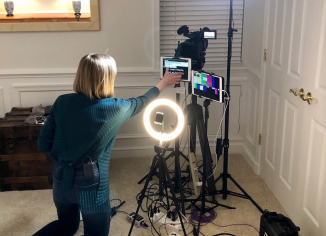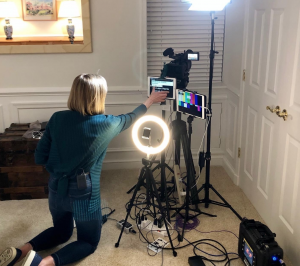
Every day, these homemade shots are looking better and better. Granted, some of the pros have unmanned field TV gear in their homes, but not everyone does, and the guests probably don’t. So how is it being used? Here are some recent examples thanks to a skim of recently published stories.
New shows are being created that focus on how to feel connection while social distancing: “Set to air Saturday, April 18, from 8-10 p.m. ET/PT, One World: Together at Home saw NBC’s Jimmy Fallon, ABC’s Jimmy Kimmel and CBS’ Stephen Colbert host the broadcast, which was produced in partnership with Global Citizen and the World Health Organization.”
CBS’s All Rise is going back into production for a virtually-produced episode inspired by the COVID-19 crisis. The drama, from Warner Bros. TV and CBS TV Studios, will be filmed using Facetime, Zoom, and other online technology. “It’s a unique chance for our All Rise family to band together – in our different homes, even cities – to tell a story about resilience, justice, and the power of community,” said executive producer Greg Spottiswood. While talk shows have returned with hosts working from home, All Rise is the first scripted series to be produced virtually.
MSNBC and CNN are doing Town Hall programs with guests and hosts from multiple online locations.
The late-night shows are being produced from the homes of the hosts. Trevor Noah, Stephen Colbert, and John Oliver have all been producing remotely.
Concerts are being produced using the meeting software with artists’ collaborations from their homes.
What was once the domain of the video blog (full disclosure, I’m a regular on TechCrunch TV’s “Gillmor Gang”) is now a mainstay of today’s modern media landscape.
But I have some questions:
- How much of this new production paradigm will continue to exist after the virus has passed?
- How will the unions deal with this new normal?
- How will all the highly qualified professionals integrate into the new world?
- What new software and hardware will emerge?
- Will viewers no longer mind if the production quality of the product has declined, or will home production step up and improve with time?
Much of local news all over the country is being done from home. Producers are doing lineups, interviews are happening online, elements are being fed over the internet to editors who assemble and distribute the finished product, music production, and video post-production, have become collaborative home efforts.
It seems to me, the longer we are working from home, the better TV production in the time of coronavirus will become.
But will it persevere?